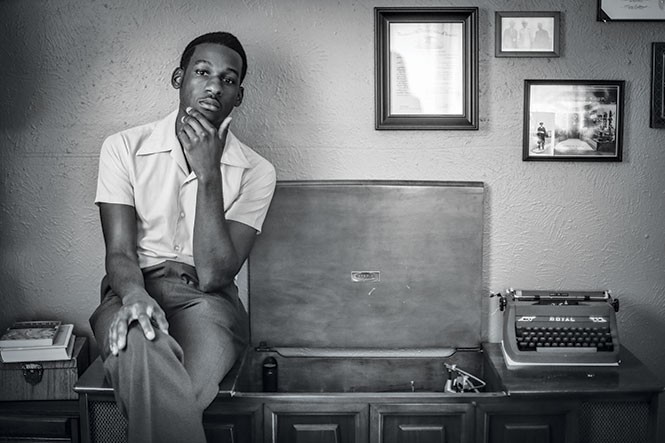
Less than two years ago, throwback soul singer-songwriter Leon Bridges was a dishwasher at a restaurant in his hometown of Fort Worth, Texas, performing at open mics and occasional house shows on the side. Fast-forward to December 2014, and he's signing with Columbia Records (following in the footsteps of soul legends like Aretha Franklin and Marvin Gaye) and preparing for a national tour promoting his debut album, Coming Home.
As 2016 rolled around, the 26-year-old was paying tribute to Ray Charles at the White House. Now, he's hitting venues across the globe, with shows booked nearly every day through October. But overnight sensations sometimes fade as fast as they materialize.
Here are some reasons that prove Leon Bridges' smooth retro soul is here to stay.
He's got the look. Bridges lives, breathes and bleeds vintage, from his retro haircut to his dapper, 1960s-inspired ensemble of suspenders, feathered fedoras or the famous high-waisted denim Wranglers that first caught the attention of Joshua Block of Austin rockers White Denim, who are often credited for discovering Bridges. Bridges' black-and-white videos and groovin' moves ripped from the past are just a couple of fine details that solidify his retro aesthetic. Nailing these nuances enables him to reel in, and keep, older listeners that grew up with the classics.
He's got the sound. Bridges really studied the influences that inform his old-school soul—a throwback to that of the '50s and '60s. That attention to detail made his songs unbelievably authentic-sounding. The simple guitar and short, sweet and upbeat lyrics are easy to latch onto, like this line from "Coming Home": "Sweet, pretty baby/ won't you be my lady, oh/ sweet honey, darling/ don't you know I'm calling/ I want you." The classics are irreplaceable, of course, but Bridges genuinely honors the genre, its history and its legendary musicians, while reintroducing old-school soul into the mainstream. "Coming Home" reached No. 5 on Spotify's Top 10 Most Viral Tracks in February 2015, shortly after its release.
He's got crossover appeal. While classic soul is relatable, not every music fan seeks it out. White Denim—who produced Bridges' first couple songs and brought him on tour—introduced Bridges to a rock audience. His involvement in the Macklemore and Ryan Lewis song, "Kevin," gives him entry into the pop world. And both things happened organically for Bridges, based on the quality of his music. Early, wide exposure to a diversity of ears equals a strong foothold in a notoriously fickle industry.
Looking toward the future, Leon Bridges may want to take one last bit of advice from the past. In 1964, the year of his death, Sam Cooke, then 33 and at the peak of his career, appeared on American Bandstand. Host Dick Clark asked him his secret, to which he replied, "I think the secret is really observation, Dick. ... If you observe what's going on, how people are thinking and determine the times of your day, I think you can always write something that the people will understand." CW